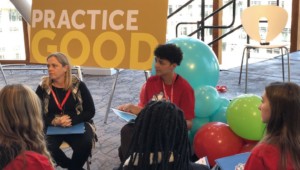Good Work: Freedom and Virtue

The economies of Southern European have become a global anchor. Arguments about the path forward pit austerity versus growth, but the more fundamental fault is the enterprise of Northern Europe versus the sloth of the South. The economic crisis again pits the principles of free economies against weaker incentives and stronger social supports. Here in the U.S., the news of the last 12 months have been full of “Occupy” protestors and “1 percent” arguments and “blame the rich guy.”
That backdrop made the Booknotes appearance of Father Robert A. Sirico, author of Defending the Free Market: The Moral Case for a Free Economy, a timely consideration of the inherent nature of free markets. Father Sirico argues that a free economy promotes charity, selflessness, and kindness. He argues that free-market capitalism is the best way to ensure individual success, broad prosperity, but also the path to a moral society. Sirico suggests we’ve explore alternatives to free markets and they kill individual freedom, dampen incentives for enterprise, and quash creativity and innovation. The alternatives may be lousy, but free markets promoting selflessness may seem like a stretch.
Father Sirico told the story of being a leftist colleague of Jane Fonda. He observed the limitations and unintended consequences of charity. He came to to two conclusions: 1) we can’t have freedom without a free economy, and 2) the best way to help the poor is to a start a business.
A Catholic priest, Sirico is the co-founder of the Acton Institute, a non-profit organization focused on the study of religion and liberty, they seek “to articulate a vision of society that is both free and virtuous.”
Sirico suggests “a free economy—necessarily including private property, legally enforceable contracts, and prices and interest rates freely agreed to by willing parties to transactions (not set by government bureaucrats)—is the best way to meet society’s material needs, from basic nutrition to sophisticated health care technology.” He notes, “Private enterprise in the free market has lifted millions out of dire poverty—far more people than state welfare or private charity have ever rescued from want.
Sirico makes the case that free markets are better than the alternatives, but the extent to which it promotes “charity, selflessness, and kindness”—that really depends on the culture, the social norms, and the behavior of individuals. And on that score, it’s difficult to detect a macro trend toward virtue.
There does, however, seem to be an increase in the percentage of young people interested in doing work that matters. I interviewed a young lady yesterday that said, “I want to join a cause not just a company.” There has been an explosion of mission-driven organizations in the decade—a combination of tech-powered philanthropy and a generation of young people that want to make a difference. America is the best place in the world to make a difference in the world–it’s a good place to raise philanthropic or venture capital, it’s a place hire innovative and creative people, and it’s a pretty good place to run a business.
Freedom allows us to dream, markets allow us to aggregate capital, from that point on it’s really about mindset. If enough of us approach our work with a contribution mindset, we may prove Sirico right.





0 Comments
Leave a Comment
Your email address will not be published. All fields are required.